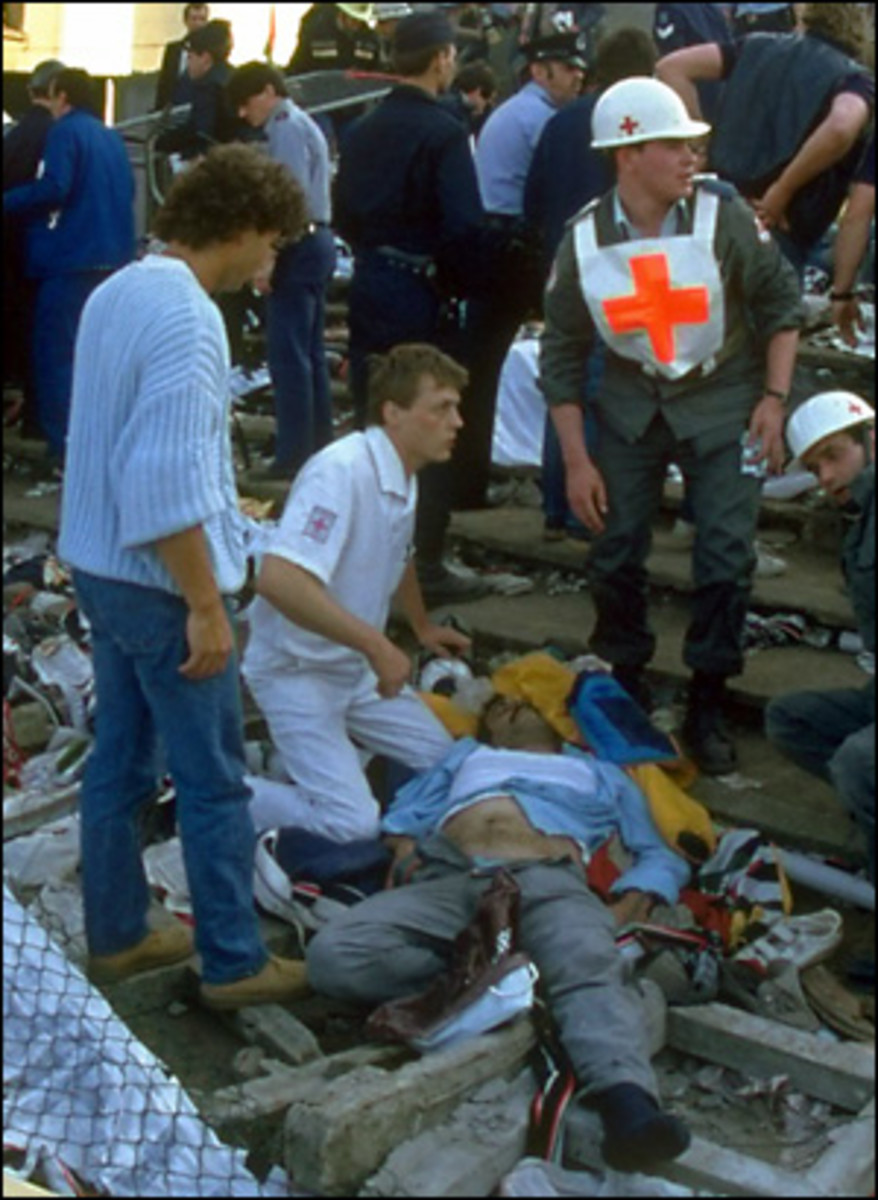A day that lives in infamy
But fate works in mysterious ways. The game has a unique opportunity to confront its past on the 20th anniversary of European soccer's greatest public tragedy. Last week's Champions League quarterfinals draw pitted Juventus against Liverpool on April 5 in what is bound to be one of the most emotional nights of the year.
For those who don't know, what came to be known as the Heysel tragedy (after the name of the stadium in Brussels, which hosted the match and since has been renamed) changed the face of the European game. Before kickoff, fighting between both sets of fans led English supporters to storm the adjacent stands (which should have been filled with "neutral" fans but, in fact, contained many Juve supporters). The Juve fans were driven back against a wall, which soon collapsed, and 39 people were killed in the scrum.
The situation degenerated largely because of inadequate security measures and insufficient policing, and to this day, that's pretty much all both camps can agree on. In his book, Le verità sull'Heysel (The Truths of Heysel), Italian journalist Francesco Caremani points out that each side has its own version of events. In England, the story goes, Liverpool fans were provoked by Juventus supporters, who then fled and died when a wall collapsed on top of them. In Italy, many believe that innocent fans were butchered by rampaging hooligans and, in fact, the collapse of the wall actually helped minimize the death toll, as it allowed fans to escape.
The impact on the European game was enormous. English clubs, who until that point had been dominating continental competitions, were banned from inter-European competition indefinitely (they were readmitted in 1990; Liverpool had to wait until a year later). When Heysel was taken into consideration with the Hillsborough tragedy (an even greater catastrophe in 1989, when 96 were crushed to death), English authorities were able to pass new legislation making grounds safer and easier to police, which eventually helped eradicate hooliganism almost completely.
Today, something on the scale of Heysel likely could not happen, partly because of tougher policing, partly because UEFA takes security more seriously and partly because the nature of fans has changed. But the horrific memories persist.
That is no reason to pretend it never happened, which is essentially what Juventus does on its official Website. Go to the history section and you'll simply find mention of the fact that the club won the European Cup in '85. That's it. Liverpool at least acknowledges on its site the fact that 39 people died, though the blame is placed mostly with the authorities and "provocation" from Juve fans.
In situations such as these, the best you can hope for is closure. Some have called for Juventus to give back the trophy. After all, the match never should have been played, and Juve's 1-0 win was the result of a controversial penalty. Others would like the clubs and UEFA to at least formally acknowledge what happened so the dead and the lessons of that day may never be forgotten.
But perhaps the best suggestion comes from the organization which represents the victims of Heysel, which is calling for a friendly match between both clubs on May 29, exactly 20 years later. It would be the most fitting way to lay this darkest of days to rest.
So UEFA is convinced that Chelsea lied when it accused Barcelona boss Frank Rijkaard of paying referee Anders Frisk a visit in his private dressing room during halftime of the Barcelona-Chelsea clash last month. And UEFA now is charging Chelsea with "bringing the game into disrepute," a charge which could, theoretically, see the Blues kicked out of Champions League (though a fine or suspension for coach Jose Mourinho is more likely). While the penalties might be warranted, was it really necessary for the organization that runs European football to be so one-sided in its statement last week? UEFA said Chelsea fabricated a "false" accusation to "poison" the ambience of the game. The hearing isn't until March 31. Whatever happened to "innocent until proven guilty"?
Australia has taken steps to leave the Oceania Football Confederation (OFC) and join the Asian association. This is good news for the Australian game. The OFC is an absolute joke and provides zero competition for Australia. By playing against sides such as Iran, Japan, South Korea and Saudi Arabia, Australian soccer will improve and gain credibility. The next step would be to simply merge both confederations into one. ... Franz Beckenbauer's decision to challenge Michel Platini for the UEFA presidency next year could be a turning point for the game. Regardless what happens, UEFA will finally get a leader who played at the very highest level just a few decades ago. That can only be a good thing. If Platini, who is close to FIFA boss Sepp Blatter, wins, expect much closer collaboration between UEFA and FIFA. If Beckenbauer is successful, expect more of the status quo, with the established powers in Europe and South America countering Blatter's globalization push.





